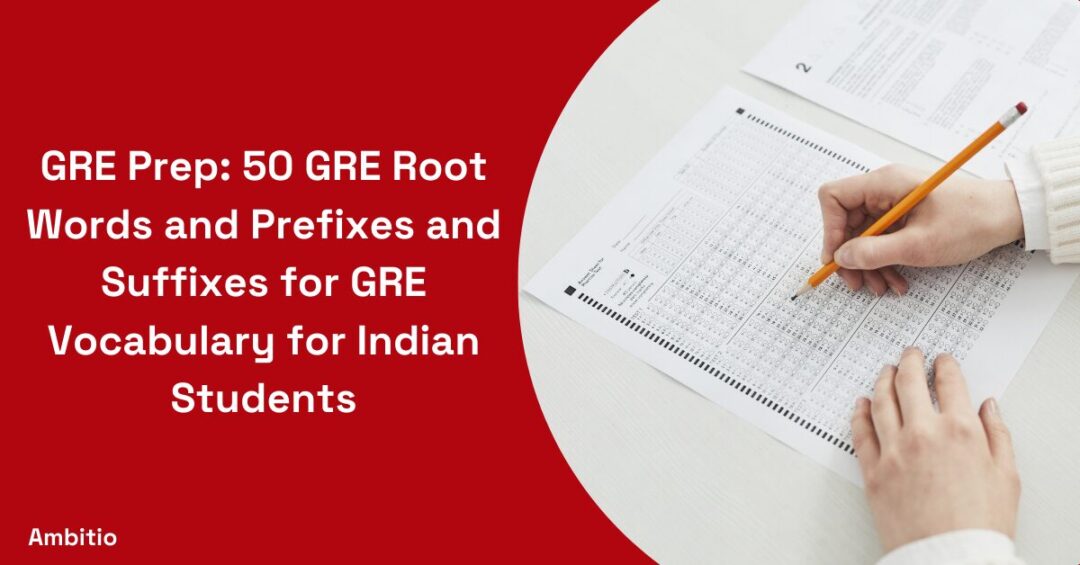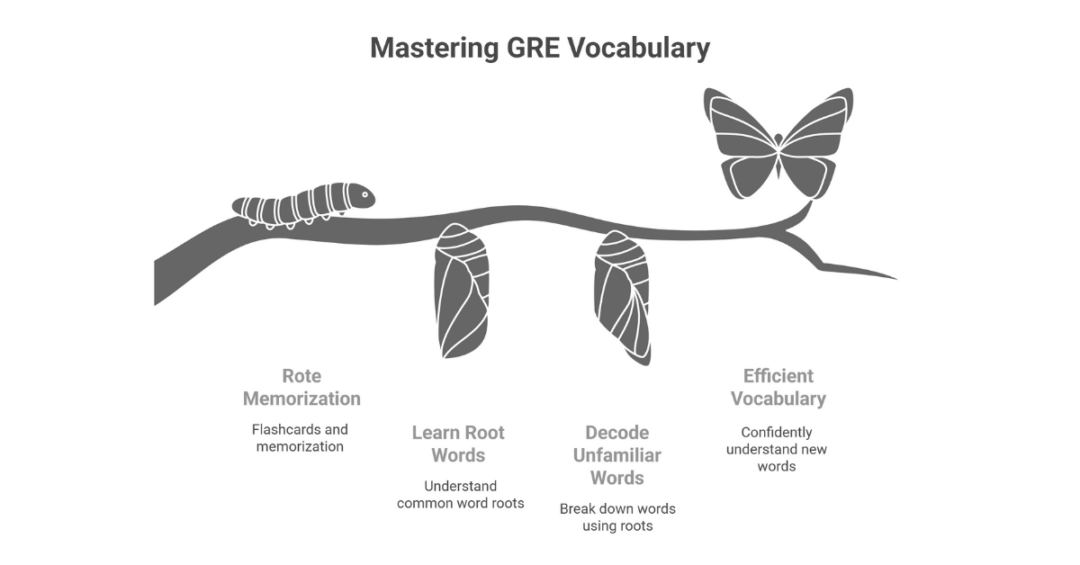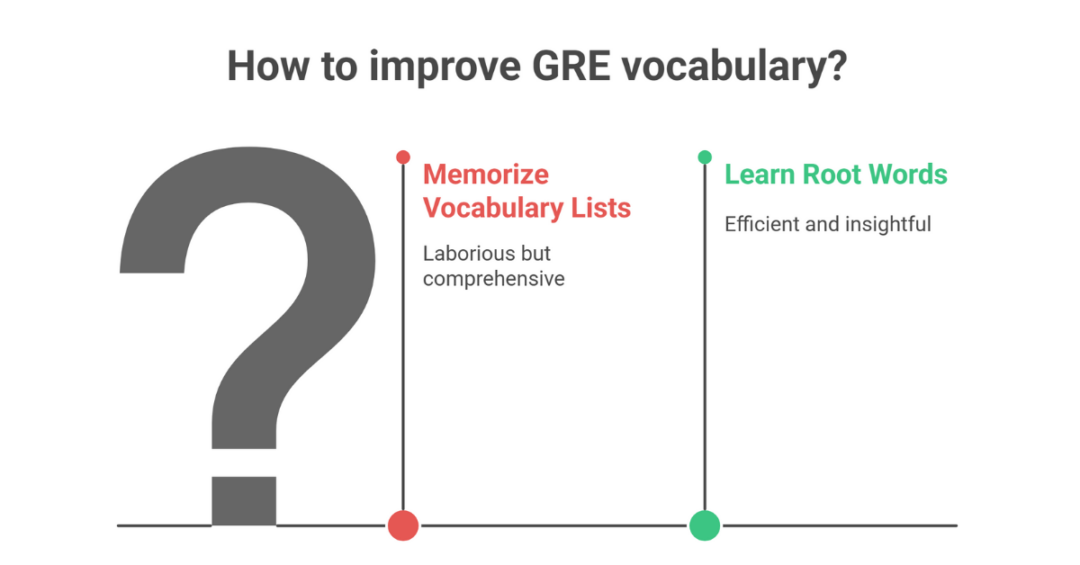12 August 2025
5 minutes read
GRE Prep: 50 GRE Root Words and Prefixes and Suffixes for GRE Vocabulary for Indian Students

Key Takeaways
- GRE root words help students decode unfamiliar vocabulary by identifying the base meaning, making word memorization more efficient.
- GRE root words strengthen verbal reasoning skills by allowing test-takers to infer definitions from common linguistic patterns.
- GRE root words provide a strategic advantage in the exam’s text completion and sentence equivalence questions.
Did you know that by learning only 50 GRE root-words, you can figure out the meanings of thousands of vocabulary words that you will see on test day? It’s like having a secret weapon for the most challenging aspects of the verbal section, allowing you to back into unfamiliar with confidence.
You don’t just look smart using this technique, you’re also very smart for wanting to ace GRE exam with the least amount of effort involved! It’s really frustrating when flashcards and rote memorization don’t work for you as well as you hoped.
You feel more unprepared when you see these words in practice questions and the frustration of trying to convert every new word into muscle memory builds.
Rather than memorizing every word in the GRE vocabulary list, simply by learning a few root words will significantly reduce these GRE action plan that are trying to help you comprehend the 100s of words at a time, thus making studying much more efficient! and more manageable.
What Are GRE Root Words?
Learning GRE® root words can only help you understand numerous vocabulary words on the GRE. A “root” is what gives a word its basic meaning and when you understand the root the word is built off, you can start to make sense of the meaning, even if you don’t know the word.

For example, the “bene” root generally means “good” or “well,” so words like “beneficial” and “benevolent” both carry positive meanings. Knowing Latin word roots, in general, will help you to understand the basic meanings of many Graduate Record Examination without having to memorize all of them.
Roots may also help you recognize certain segments of words containing common prefixes and suffixes, such as “un-” meaning “not” or “-able” meaning “capable of.” So, “unreadable” is easily understood as “not capable of being read!” This is a good GRE preparation strategy for growing your vocabulary repertoire and making sense of unfamiliar words on test day.
While memorizing long lists of vocab words can no doubt be laborious, if you employ roots, you are likely to figure out the meaning of unfamiliar words more quickly, and gain an advantage on your GRE practice tests, full-length exams, and even GRE reading comprehension sections.
What Are The Pros And Cons Of GRE Root Words?
When studying for the GRE verbal section, learning GRE root-words can be an effective method. Root words help you dissect unknown words into their root nature, thus enabling you to more easily figure out the meanings. However, you should not assume that GRE root-words are going to cover everything you need to know.
Knowing the pros and cons will help you understand how best to implement this in your GRE prep.
| Pros | Cons |
|---|---|
| Boost your GRE verbal score: Root words can help you recognize the basic meaning of many GRE vocabulary words, allowing you to answer questions faster. | Doesn’t cover everything: Some GRE vocab words don’t follow common roots or are exceptions, so knowing root words alone doesn’t actually mean you’re ready for every word. |
| Recognize unknown words: Using root words, prefixes, and suffixes will allow you to derive unfamiliar-words that may pop up on test day. | Less reliable: Some GRE words share the same root but can have completely different meanings, and just rely only on roots will confuse you. |
| Expand your vocabulary: Roots will help you identify new words and comprehend words that may sound complex, giving you a boost to your total English vocabulary. | Know full definitions: Knowing the basic definition of a root doesn’t mean that you also know the full nuance of the words when they are in context. |
| Good for practice tests: Understanding roots can help you perform better on GRE practice exams and official full-length exams. | Time investment: Although learning roots, prefixes may save time, it still takes time to learn each of these, and there are other important areas in GRE prep, like reading comprehension, that you will want to focus your time on. |
| Helpful for multiple words: When learning a root word you can potentially read and understand multiple words like “benevolent,” “beneficial,” or “benefactor,” in an efficient way. | Limited utility: While roots will help you with basic words, the GRE incorporates much more complex or obscure words that you won’t be able to dissect by only memorizing roots. |
50 Popular GRE Root Words To Know In 2024
When you are familiar with common roots, prefixes, and suffixes-you can quickly find out and master what an unfamiliar-word means, thereby saving time and eliminating mistakes during the GRE test prep.

Here are 50 common GRE root-words to learn in 2024, definitions, and examples.
| Root, Prefix, or Suffix | Meaning | Examples |
|---|---|---|
| bene | Good, well | Benevolent, Beneficial, Benefactor |
| mal | Bad, evil | Malfunction, Malicious, Malady |
| anthro | Human | Anthropology, Philanthropy, Misanthrope |
| auto | Self | Autonomy, Autograph, Automatic |
| bio | Life | Biology, Biography, Antibiotic |
| chrono | Time | Chronology, Chronometer, Synchronize |
| dict | Speak, say | Dictate, Dictionary, Predict |
| duc/duct | Lead | Conduct, Educate, Induce |
| gen | Birth, race | Generation, Genesis, Genetic |
| graph | Write | Autograph, Graph, Biography |
| jur/jus | Law, justice | Jurisdiction, Justice, Jury |
| log/logy | Word, study | Logic, Biology, Apology |
| luc/lum | Light | Illuminate, Translucent, Luminary |
| man | Hand | Manual, Manipulate, Manufacture |
| path | Feeling, suffering | Empathy, Pathology, Sympathy |
| phon | Sound | Telephone, Phonetic, Symphony |
| port | Carry | Transport, Portable, Export |
| scrib/script | Write | Scribble, Manuscript, Describe |
| sens/sent | Feel, perceive | Sensitive, Sentiment, Resentment |
| spec | Look, see | Spectator, Inspect, Perspective |
| struct | Build | Construct, Structure, Destruction |
| terr | Earth | Territory, Terrain, Terrestrial |
| therm | Heat | Thermal, Thermometer, Hypothermia |
| vid/vis | See | Visual, Video, Invisible |
| voc/vok | Call, voice | Vocal, Invoke, Advocate |
| ambi | Both, on both sides | Ambidextrous, Ambiguous, Ambivalent |
| aqua | Water | Aquatic, Aquarium, Aqueduct |
| ced/cess | Yield, go | Recede, Process, Accessible |
| cide | Kill | Homicide, Pesticide, Suicide |
| circum | Around | Circumference, Circumspect, Circumvent |
| contra/counter | Against, opposite | Contradict, Encounter, Counteract |
| cred | Believe | Credible, Credulous, Credential |
| de | Down, away | Detract, Decrease, Deflate |
| dict | Say, declare | Dictate, Contradict, Prediction |
| equi | Equal | Equitable, Equilibrium, Equator |
| ex | Out of, away from | Exceed, Exclude, Exit |
| fort | Strength | Fortify, Fortress, Effort |
| fract/frag | Break | Fracture, Fragment, Fragile |
| inter | Between, among | International, Interact, Intercept |
| intra | Within, inside | Intramural, Intravenous, Intranet |
| ject | Throw | Eject, Inject, Reject |
| macro | Large, long | Macrocosm, Macroeconomics, Macroscopic |
| micro | Small | Microbiology, Microscope, Microcosm |
| multi | Many | Multicultural, Multitask, Multiply |
| neo | New | Neophyte, Neoclassical, Neonatal |
| omni | All | Omnipresent, Omniscient, Omnivore |
| peri | Around, surrounding | Perimeter, Peripheral, Periscope |
| poly | Many | Polygon, Polyglot, Polyester |
| pre | Before | Precede, Predict, Prejudice |
| re | Again | Rebuild, Refine, Rediscover |
Conclusion
When you know your roots, you’re armed with the most time efficient, surprisingly effective way to manage unknown vocabulary on test day. More than that, it changes the way you think about language, and gives your GRE prep less of a “cramming” feeling, and transforms it to smart learning.
In summary, roots are a flexible, foundational way to streamline your GRE review process. Like a good strategy it is not a silver bullet.
Make sure to couple your understanding of roots with consistent practice, contextual exposure to GRE vocabulary, and practice exams to complete your preparation to help you improve your scores. In brief, roots help deepen your verbal foundation, and success is greatest with that knowledge, and complementary preparations.
Elevate your GRE prep with Ambitio’s expert guidance. Our platform provides a tailored study experience, combining adaptive learning technologies with expert insights to improve your performance in analytical writing, quantitative reasoning, and verbal reasoning.
FAQs
What are GRE root words and why are they important?
How can GRE root words improve my GRE score?
Where can I find reliable lists of GRE root words?
How should I study GRE root words effectively?
Do GRE root words help with sentence equivalence questions?
How many GRE root words should I learn for the exam?
It’s ideal to learn at least 300–500 GRE root words to cover a wide range of vocabulary. Mastery of GRE root words gives you a significant advantage on test day.
Are GRE root words helpful for non-native English speakers?
Absolutely, GRE root words give non-native speakers a strong foundation for building vocabulary. By using GRE root words, they can connect new terms to familiar patterns.

You can study at top universities worldwide!
Get expert tips and tricks to get into top universities with a free expert session.
Book Your Free 30-Minute Session Now! Book a call now




























